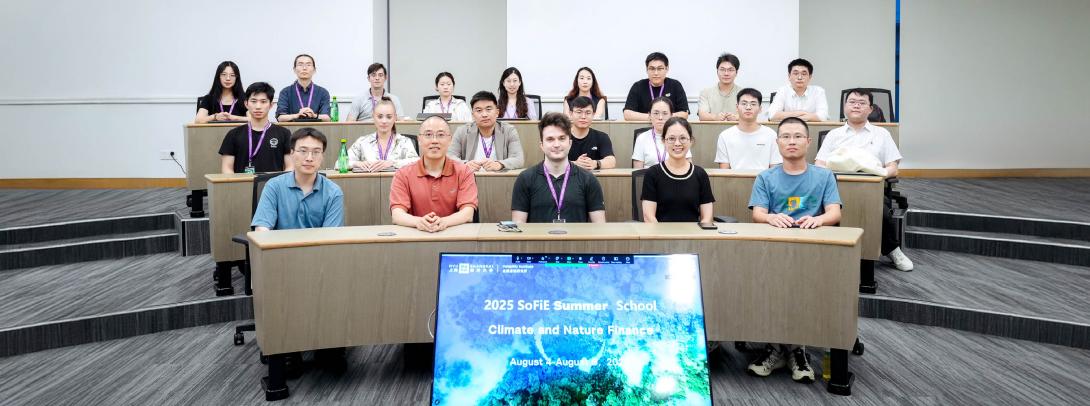The Society for Financial Econometrics (SoFiE) Summer School returned to NYU Shanghai from August 4 to 8, gathering roughly 40 PhD students and junior faculty members from across Europe, Asia, and Australia. This year marked the eighth summer school hosted by the Volatility Institute at NYU Shanghai (VINS), continuing its tradition of convening leading experts and young scholars for an intensive week of study and discussion.
The 2025 summer school focused on Climate and Nature Finance, reflecting the growing urgency of addressing climate-related risks and their impact on financial markets. Opening the program, Chancellor Jeffrey Lehman highlighted the global stakes of the issue: “It’s not enough just to describe the dangers qualitatively,” he said. “We need to analyze them with the most advanced quantitative methodologies available, develop sound metrics for risks, and use those metrics to inform strategies across markets and governments.”
This year’s lectures were delivered by two distinguished scholars, Professor Zacharias Sautner, a leading scholar in sustainable finance from University of Zurich, and Professor Emirhan Ilhan from National University of Singapore, whose research focuses on the interaction between climate risks and financial systems. Together, they provided participants with cutting-edge insights on how environmental shocks, regulatory frameworks, and transition pathways are reshaping modern finance.
Professor Sautner’s lectures guided participants through the landscape of climate and nature finance, climate transition risks, corporate climate lobbying, nature risks, and perceptions of corporate nature risks. In a special session, he shared hands-on experience in career and publishing advice. Meanwhile, Professor Ilhan’s sessions covered an introduction to climate finance, physical climate risks, and climate research and geospatial data.
Professor Ilhan emphasized the interdisciplinary nature of the field, noting that climate finance requires not only technical skills in economics and data analysis, but also the ability to collaborate with experts in environmental science, law, and political economy. “What we know the least about—such as adaptation measures, migration patterns, and insuring against physical risks—are precisely the areas where young scholars can make the biggest contributions,” he said.
Ilhan also urged participants to think beyond existing literature and learn to ask the right questions. “By the time you read a paper, it is already outdated in terms of the frontier,” he said.“The more valuable skill is to recognize what has not been done, and why. That is where your work can truly make an impact.”
The cohort of participants came from a diverse group of institutions, including Imperial College London, Warwick Business School, Peking University, University Paris Dauphine, RWTH Aachen University, the University of Queensland, and Macau University of Science and Technology.
“The program was very well organized – it moved smoothly from fundamentals to the latest developments. For someone just starting out in climate finance, this structure was extremely helpful,” said Liu Mingyu from Dongbei University of Finance and Economics. “Most importantly, the chance to discuss research face-to-face with leading scholars was hugely valuable.”
Jiang Binghan from University Paris Dauphine, PSL highlighted the value of feedback and collaboration. “I greatly benefited not only from exposing my working papers to feedback, but also from meeting PhD candidates from around the world who share an interest in this area,” he said.
For Wang Lufan from Macau University of Science and Technology, the school was transformative both academically and professionally. “Through engaging lectures and guest speakers, I gained a solid understanding of ESG, carbon pricing, and green bonds, along with practical econometric training,” she said. “What made the experience even better was how approachable the professors were – they encouraged questions, discussions, and even gave career advice.”
With its focus on a field that will only become more relevant in the years ahead, the 2025 SoFiE Summer School offered participants a valuable opportunity to learn, exchange ideas, and build connections. As Professor Ilhan noted, the challenges of climate change are ongoing, and continued collaboration and research will be essential moving forward.


